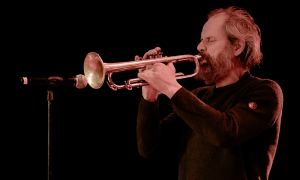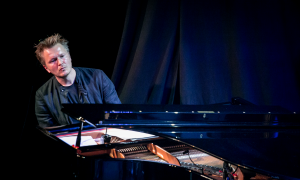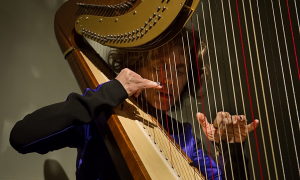Home » Jazz Articles » Festivals Talking » Jazzkaar Interviews: Kirke Karja
Jazzkaar Interviews: Kirke Karja

Courtesy Rene Jakobson
This trio will appear at Jazzkaar on Tuesday 25th April, premiering an XL manifestation, mostly concentrating on a doubling-up of instrumentation. It's something of an international supergroup, combining the lightning talents of Sun-Mi Hong (drums), Elias Stemeseder (piano), Verneri Pohjola (trumpet) and Felix Henkelhausen (bass).
Your scribe interrupted Karja's fearsome notational drive, as she prepared the individual parts for these mostly new compositions. How did XL begin its existence? "Last summer, my trio and Sun-Mi Hong met in Italy, and we played a little bit as a quartet," she says. "It felt really inspiring." Karja thought that they could repeat this formation, but she also recalled that three years ago, she and Stemeseder had vowed to try out a duo situation. Also, she'd discussed a collaboration with Pohjola, so it was one step away to consider bringing all of these intentions together in a seven-piece ensemble. Amalgamating these concepts was something of a masterplan, perfectly suited to Jazzkaar, a festival which always encourages ambitious projects and new music premieres.
"Miniature Extended" opens up The Wrong Needle, like an industrial explosion, followed by a construction site, putting it all back together again. It's hyper—percussive, largely due to Wandinger's heavy array of metal and wood: a cacophonic catharsis, with moderne classical piano explorations. It's one of the most exciting bursts of music you'll hear right now, tense, invigorating and suitably epic, as its cyclic progressions are made amidst sonic disarray, lurching and heaving as it grasps its nine minute goal. This is followed by two minutes of minimalist sensitivity, courtesy of "All The Time And Through Time." As a trio, Karja/Renard/Wandinger (as they style themselves) have an enlarged big-gesture reach. Later, there are a pair of numbers that reflect progressive rock momentum and intricacy ("Mull" and "Oktett"), with convoluted theme developments at high speeds. The closing "Lament" is a doomy cascade of deep foreboding.
"We'll take one piece from The Wrong Needle, 'Lament,' because I think it sounds quite orchestral, and it could really have a large sound. Everything else is totally new, seven pieces, and then there are four pieces that we just recorded in Budapest, with the trio. I'll make some changes and we'll play them as XL. We'll meet a day before [the Jazzkaar performance] and have one rehearsal in the evening. There's plenty of space for improvising, and listening to each other."
The XL guest players are equipped with the notation, and are all well-versed in sudden reading accuracy, plus a refined sense of inspirational speed-of-moment creation. Karja's personnel selections are ideal in terms of compatibility with her own high-wire instincts. "They can all react really fast," she enthuses. "It happened really naturally [the selection]. Elias has played a lot with Felix, and Verneri and Sun-Mi are both Edition Records artists, so it seemed to me that they could work together really well. Each of them is individually a frontperson, or headliner."
The trio recording session at the Budapest Music Center took advantage of that great institution's multifaceted set-up. "We had a concert at the Opus Jazz Club [part of BMC], and we were also thinking that we should record some new material, and somehow everything worked out really well. At first I asked them if we could rent the room [the BMC's main concert hall], but it turned out that we collaborated with BMC Records [the venue's in-house label]. I'm really excited by this, I really like the label a lot."
So now an album is in the can, set for release sometime this autumn. "It was the perfect place for this kind of music," Karja reflects on the concert hall recording location. "The room gave us ideas and inspiration." She believes that the space and its acoustics provided an almost sacral atmosphere to the session.
Karja is particularly concerned with the relationship between spontaneous and premeditated aspects of music. "The music that I'm doing these days, there are some elements that are written out, quite complicated to play, and then we continue improvising with the same elements. The material is at the same time really strict, but also really free. The opposites are represented."
When Karja formed the trio, some observers pointed out that it would be difficult to rehearse, dwelling in separate countries. "We have a really good connection," Karja counters. "We can read each other quite well. Their sight-reading skills are amazing, so it feels to me that maybe even if we lived in the same country, or city, I wouldn't rehearse with them much. I love the element of surprise!"
Karja considers the trumpet to be the odd instrument out, as it's the only one not doubled. Inspired by Pohjola's work with Mika Kallio on Animal Image (Edition Records, 2018), she's hoping to coax him into a 'non-trumpet' realm of abstract environmental landscaping. Karja is feeling less assured than ever before, more uncertain of this partly unpredictable XL outcome, but she also considers this risk-taking stance to be a beneficial condition for the artist.
Jazzkaar 2023 runs from April 23 to 30. Karja and company play on Tuesday 25th...
During recent years, your scribe has witnessed the ongoing conceptual evolution of Karja, at the Jazzkaar and Tallinn Music Week festivals. In the last year, this current trio has also appeared at Punkt in Norway and at Jazzfest Berlin. Here's a selection of review excerpts from those Estonian festivals...
The Kirke Karja Quartet
Jazzkaar 2018
First appeared in The Brooklyn Rail
Upon witnessing her as a bandleader on several occasions, it's remarkable that Karja continually provokes consistent change in her line-ups, as well as in their general stylistic direction. This time, the horn front line was retired in favour of guitarist Kalle Pilli, assisting a doom-prog opener, with an accelerating riff structure, the leader sprinkling glassy trinkles at high velocity, navigating skipped, jerky beats. A bluesy, funk developed out of bowed bass sparseness, and a percussive arrhythmia made a sudden cutaway to pinched guitar distortion. By this time, we could have been into the Stockhausen number that she apparently included as the second piece, but the three works played sounded more like a lone suite-like journey. Flickering white lines on the rear-stage lighting lozenges exacerbated the heady jolting of the music. Karja included player piano impersonations and prepared interior rummagings, alongside funksome honky tonkin,' all these elements delivered with absolute confidence and a belligerently exact virtuosity.
Captain Kirke & The Klingons
Jazzkaar 2019
First appeared in Jazzwise
Captain Kirke & The Klingons featured the powerful Lithuanian reedsman Liudas Mockūnas in a quintet line-up. Okay, so that's not the ideal bandname for such a severe outpouring of loquaciously arranged extremity, but it might give we Trekksters a certain quiver of cosmic anticipation. The Klingons also included a pair of French players, Pierre Lapprand (saxophones) and Etienne Renard (bass). Mockūnas and Lapprand combined sopranos to begin, mewling in harmony, with the former graduating to monster contrabass clarinet, hacking up substratum sputum, and indulging in industrial overblowing. Vistas of mordant meditation were unveiled. Mockūnas delivered a glottal soprano solo, closely partnered by the Lapprand tenor, in a crawling march, as Hans Kurvits used mallets on his drum skins. There was an abrupt jolt into a scintillatingly spiky jitter, Karja's piano to the fore, as Mockūnas barked "less reverb!" (twice), and finally "no reverb!," before a full icepick-in-the-forehead double tenor throttling alongside Lapprand. This is Karja's best band so far, her swift evolution seemingly demanding no restrictions.
The Meat
Tallinn Music Week 2020
First appeared in Jazzwise
The Meat is a fresh threesome assembled by the leading Estonian pianist Kirke Karja. She met her playing partners in the digital realm, but they just knew for sure that they'd coalesce in the fleshly world. Karja was joined by Norwegian bassist Christian Meaas Svendsen and Finnish drummer Ilmari Heikinheimo, the three initially adopting a soft approach, sensitively probing. It was not too long before they leapt towards intense activity, with scuttling sticks, lyrical piano flourishes and bass brutality threatening over on the Barry Guy side of the street. Karja cultivated a massive glacial splintering, then ruminated under the piano lid, making a finger-stroked string interlude. A halting cascade of detailed events, with pointillist droplets always activated, and the bass gaining the height of a violin's range. Cymbals were fisted, shimmering into a morbid doomscape, as the pivotal longer piece made way for a shorter meditation. Eventually, even this closed up in dramatic fashion, with driven stabs and blows on the piano keys. The Meat represented the finer end of improvisatory unpredictability, flash-fried for their debut.
The Raimond Mägi Trio
Jazzkaar 2021
First appeared in Downbeat
The Raimond Mägi Trio was led by a bassman, but featured one of Estonia's increasingly prominent players, the pianist Kirke Karja. Dark and demure, a shaded groove developed, following a dramatic lurch. A deep olive light emphasised the mood, as a microcosmic softness was dotted by star-system scurf. Then, the sharp funk returned, Karja strumming under her lid, initiating extreme quiet. She turned to the Valente keyboard, a new Rhodes equivalent, in retro-design, "Anxiety" making its stumpy, halting march, funky yet free. 'Sparrow' will be on their next album, a complex clutter of stutter, with an ungainly gait, powered up by violent hammerings from the piano, followed by an explosive drum solo from Karl-Juhan Laanesaar. It bodes well!
All vintage review excisions penned by Martin Longley.
Tags
Festivals Talking
Kirke Karja
Martin Longley
Estonia
Tallinn
Ludwig Wandinger
Sun-Mi Hong
Elias Stemeseder
Verneri Pohjola
Felix Henkelhausen
Mika Kallio
Jazzkaar
Tallinn Music Week
PREVIOUS / NEXT
Support All About Jazz
 All About Jazz has been a pillar of jazz since 1995, championing it as an art form and, more importantly, supporting the musicians who make it. Our enduring commitment has made "AAJ" one of the most culturally important websites of its kind, read by hundreds of thousands of fans, musicians and industry figures every month.
All About Jazz has been a pillar of jazz since 1995, championing it as an art form and, more importantly, supporting the musicians who make it. Our enduring commitment has made "AAJ" one of the most culturally important websites of its kind, read by hundreds of thousands of fans, musicians and industry figures every month.

























